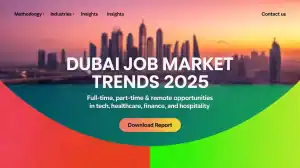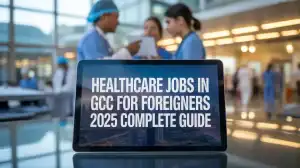Dubai Job Market 2025
Dubai’s job market in 2025 is experiencing a remarkable surge, making it one of the most promising employment hubs in the world. The UAE currently ranks 1 globally in hiring optimism, with a Net Employment Outlook of +48%, far ahead of the global average. More than half of employers are planning to expand their workforce this year, driven by Dubai’s ambitious economic diversification plans, rapid digital transformation, and large-scale investment in infrastructure. For job seekers and recruiters alike, the city’s business environment is vibrant, competitive, and full of opportunity, with tech, healthcare, finance, and hospitality leading the way. This growth is supported by government initiatives such as Dubai’s D33 strategy, AI integration projects, and a renewed focus on attracting global talent.
Employment Types: Full-Time, Part-Time, and Remote Work
While full-time employment remains the backbone of Dubai’s job market, there has been a steady rise in part-time and remote work options. Labour law reforms have made it easier for professionals to legally take on part-time roles, opening doors for skilled workers in industries such as technology, education, and hospitality to work on flexible schedules. In 2019, part-time jobs accounted for less than 3% of the UAE’s workforce, but in 2025, they are becoming more common, especially in project-based or seasonal roles.
Remote work is also a permanent fixture in certain industries. Although the percentage of fully remote job listings has dipped slightly from pandemic peaks, hybrid work models are now widespread, particularly in tech, finance, and professional services. Dubai’s introduction of the Remote Work Visa and its ranking as the #1 city globally for digital nomads highlight the city’s strong infrastructure and openness to flexible working arrangements. This shift gives employees greater work-life balance and offers employers access to a broader talent pool.
Technology Sector: Innovation Driving High Demand
Dubai’s technology sector is expanding rapidly in 2025, with job openings increasing by around 20% compared to last year. The city’s investment in AI, cloud computing, and cybersecurity is creating demand for professionals such as software developers, data scientists, cloud architects, and ethical hackers. Tech startups, multinational corporations, and government-backed innovation hubs are all competing for top talent.
What makes the tech industry particularly appealing for job seekers is its flexibility. Many IT and digital marketing roles are offered with hybrid work options, allowing employees to work part of the week from home. Contract-based and freelance positions are also becoming common, especially for specialized skills in app development, automation engineering, and AI integration. This trend makes part-time tech jobs in Dubai more accessible, giving professionals diverse entry points into the market.
Healthcare Sector: Rising Demand and Telehealth Growth
The healthcare sector in Dubai is experiencing a hiring surge, with a +42% net employment outlook for 2025. Population growth, medical tourism, and new hospital openings are fueling demand for doctors, nurses, pharmacists, and allied health professionals. Specialist roles in cardiology, oncology, and pediatrics are especially sought after, and salaries for healthcare workers have seen significant increases.
A notable trend is the rise of telemedicine and digital healthcare platforms, creating remote healthcare job opportunities for doctors, medical coders, and IT specialists in health tech. These roles often allow hybrid work arrangements, blending in-person responsibilities with digital care delivery. As Dubai strengthens its position as a regional medical hub, both full-time and flexible opportunities are expected to grow.
Finance Sector: Stability Meets Fintech Innovation
Finance remains one of Dubai’s most stable and lucrative sectors, with a +43% hiring outlook in 2025. The city’s role as a global financial hub, combined with the growth of fintech and Islamic finance, is driving demand for financial analysts, compliance officers, investment managers, and blockchain specialists.
Many traditional financial institutions are now offering hybrid work models for certain positions, particularly in back-office operations, data analysis, and financial technology development. While part-time finance roles are less common, consultancy-based and freelance accounting jobs are emerging, especially for experienced professionals seeking flexible arrangements.
Hospitality Sector: Tourism Revival Creating Thousands of Jobs
Dubai’s hospitality and tourism sector is booming again in 2025, with millions of visitors arriving each year and several luxury hotels, restaurants, and entertainment venues opening. The UAE Tourism Strategy 2031 aims to generate AED 450 billion in tourism GDP, ensuring sustained demand for hospitality professionals.
In-demand roles include hotel managers, chefs, event planners, and sales and marketing specialists. While most hospitality jobs are full-time and on-site, there is strong seasonal demand for part-time workers during peak tourism months and large-scale events. Remote roles in hospitality are rare, but certain customer service and reservations positions can be performed from home.
Dubai Job Market Overview 2025: A Global Hiring Hotspot
Dubai’s 2025 job market is one of the most competitive and opportunity-rich environments in the world. The UAE tops global rankings in hiring optimism, with more than half of employers actively expanding their teams. Government strategies like Dubai’s D33 Economic Plan, investments in artificial intelligence, and diversification into non-oil sectors are creating thousands of new roles. For both job seekers and recruiters, this is a golden era for talent mobility and career progression.
Employment Types in 2025: Full-Time, Part-Time, and Remote Options
Full-time roles remain the backbone of Dubai’s economy, offering job stability and career growth in sectors like technology, healthcare, finance, and hospitality. However, part-time opportunities are growing thanks to new labour laws, giving professionals more flexible career options. Remote work, supported by the UAE’s high-tech infrastructure and the Remote Work Visa, is also gaining ground, especially in tech, finance, and digital services.
Technology Sector: Driving the Future of Work
Dubai’s tech industry is growing at an unprecedented pace. Job seekers can find opportunities in software development, cybersecurity, cloud computing, AI, and IoT. Many employers offer hybrid models, making tech one of the most flexible sectors in terms of work arrangements. Startups and multinational firms alike are looking for digital innovators who can help drive Dubai’s smart city ambitions.
Healthcare Sector: Expanding Services and Telemedicine
The healthcare sector is experiencing a hiring boom in 2025. With new hospitals, clinics, and research centers opening, demand is high for doctors, nurses, pharmacists, and allied health professionals. Telemedicine is creating new roles that can be performed remotely, expanding opportunities for healthcare workers to serve patients across the UAE and beyond.
Finance Sector: Traditional Stability Meets Fintech Innovation
Dubai’s finance industry is thriving, blending the reliability of established banking with the creativity of fintech startups. Roles in wealth management, compliance, Islamic finance, and blockchain technology are in high demand. Hybrid work is becoming standard in certain finance roles, while consultancy and freelance opportunities are emerging for experienced professionals.
Hospitality Sector: Tourism Revival Boosting Job Creation
Tourism is back in full force in Dubai, driving demand for hotel staff, event managers, chefs, and tour guides. Seasonal and part-time work is common in this sector, offering flexibility for those seeking short-term employment. The UAE Tourism Strategy 2031 ensures that hospitality will remain a job growth engine for years to come.
Skills in Demand for 2025 Jobs in Dubai
Employers in Dubai are seeking a mix of technical expertise and soft skills. Technical skills such as cloud computing, AI, cybersecurity, and financial analysis are in high demand. At the same time, communication, cultural awareness, adaptability, and leadership remain essential for thriving in the UAE’s diverse workplace. Job seekers who combine these skills will have a significant advantage.
Salary Trends and Earning Potential
Salaries in Dubai vary widely depending on industry, role, and experience. In 2025, tech professionals and healthcare specialists often command the highest pay packages, with competitive benefits and housing allowances. Finance executives, especially in investment and fintech, also enjoy attractive compensation. The tax-free income structure continues to be one of Dubai’s biggest draws for global talent.
Job Search Strategies for Success in Dubai
To succeed in Dubai’s competitive job market, candidates should leverage both online and offline channels. Popular platforms like LinkedIn, Bayt, and GulfTalent are essential for digital job applications, while attending industry events, job fairs, and networking sessions can help build valuable connections. Tailoring your CV to UAE hiring standards and highlighting both technical and soft skills will significantly improve your chances.
Top Companies Hiring in Dubai in 2025
Highlight the leading employers across tech, healthcare, finance, and hospitality. Include multinationals like Microsoft, Emirates Group, and PwC, as well as local champions like Emirates NBD and Dubai Health Authority. Mention their hiring trends and types of roles available. Top companies hiring in Dubai in 2025 span multiple industries, offering a wealth of opportunities for skilled professionals in technology, healthcare, finance, and hospitality. Leading employers include multinational giants like Microsoft, Amazon, PwC, and Siemens, as well as regional leaders such as Emirates Group, Dubai Health Authority, Emirates NBD, and Jumeirah Group. These organizations are recruiting for full-time, part-time, and remote job opportunities to meet the city’s expanding economic demands. From tech developers and medical specialists to financial analysts and hotel managers, Dubai’s most sought-after employers are offering competitive salaries, career growth programs, and attractive expat benefits—making the emirate one of the top global destinations for ambitious job seekers in 2025.
Visa and Work Permit Requirements for Jobs in Dubai
Explain the current UAE visa system for employment, including full-time work visas, part-time work permits, and the Remote Work Visa. Cover the application process and legal requirements for expatriates. Visa and work permit requirements for jobs in Dubai 2025 are designed to attract skilled professionals from around the world while ensuring compliance with UAE labor laws. Expatriates seeking full-time, part-time, or remote job opportunities in sectors like technology, healthcare, finance, and hospitality typically require an employment visa sponsored by a UAE-based company. For flexible arrangements, options include the part-time work permit, the freelance permit, and the Remote Work Visa, allowing professionals to legally work for local or overseas employers. The process usually involves a job offer, medical tests, and Emirates ID registration, with many companies handling the paperwork for new hires. Dubai’s streamlined visa system and diverse permit options make it easier for global talent to join its rapidly growing workforce.
Freelancing and Gig Economy Opportunities in Dubai
Explore the rise of freelance work in the UAE, especially in tech, creative industries, and consulting. Include details about Dubai’s freelance permits and free zones like Dubai Media City that cater to independent professionals. Freelancing and gig economy opportunities in Dubai 2025 are thriving as the city embraces flexible work arrangements and a growing demand for specialized, on-demand skills. With the introduction of freelance permits and dedicated free zones like Dubai Media City and Dubai Internet City, professionals in technology, healthcare, finance, and hospitality can now legally work independently on local and international projects. The gig economy is creating full-time, part-time, and remote job opportunities for freelancers in fields such as web development, content creation, consulting, and event management. Supported by Dubai’s advanced digital infrastructure and global business connectivity, freelancing offers professionals the freedom to manage their schedules, diversify income streams, and tap into the city’s fast-paced, innovation-driven economy.
Women in the Dubai Job Market
Discuss how policies and workplace culture are evolving to encourage female participation, leadership opportunities, and flexible working conditions for women professionals in Dubai. Women in the Dubai Job Market 2025 are playing an increasingly vital role, with government initiatives, progressive workplace policies, and corporate diversity programs opening more opportunities than ever before. Sectors like technology, healthcare, finance, and hospitality are actively recruiting skilled female professionals, supported by flexible work arrangements, leadership training, and mentorship programs. The UAE’s commitment to gender equality, reflected in its Gender Balance Council initiatives and high global rankings, has boosted female participation across full-time, part-time, and remote job opportunities. For women seeking careers in Dubai, 2025 offers a thriving environment where talent is valued, leadership roles are more accessible, and industries are investing in inclusive growth—making the city a global leader in empowering women in the workforce.
Youth Employment and Graduate Opportunities
Focus on internships, entry-level positions, and graduate programs available in 2025. Highlight initiatives like UAE Youth Council programs and skill development courses for fresh graduates. Youth employment and graduate opportunities in Dubai 2025 are expanding rapidly, driven by the city’s fast-growing economy, innovation hubs, and government-led talent development programs. Industries such as technology, healthcare, finance, and hospitality are offering structured graduate schemes, internships, and entry-level positions to equip young professionals with essential skills. Initiatives like the UAE Youth Council, vocational training programs, and university-industry partnerships are helping bridge the gap between education and employment, ensuring fresh graduates are job-ready. With the rise of full-time, part-time, and remote job opportunities tailored for new entrants, Dubai provides a dynamic environment for youth to kickstart their careers and build a strong professional foundation in one of the world’s most competitive job markets.
Impact of AI and Automation on Dubai Jobs
Analyze how automation and artificial intelligence are reshaping the workforce. Mention which jobs are most at risk and which new roles are being created due to AI-driven transformation. The impact of AI and automation on Dubai jobs in 2025 is transforming the employment landscape, creating new opportunities while reshaping traditional roles across technology, healthcare, finance, and hospitality. Artificial intelligence is driving demand for specialists in machine learning, data analytics, and robotics, while automation streamlines operations in areas like customer service, logistics, and financial transactions. Although some routine jobs are being phased out, the rise of AI-powered tools is also generating full-time, part-time, and remote job opportunities in AI development, system maintenance, and digital transformation projects. With Dubai’s government investing heavily in its AI Strategy 2031, professionals who upskill in emerging technologies will remain in high demand, securing their place in the city’s future-ready workforce.
Sustainable Jobs and Green Economy Growth
Talk about the UAE’s investment in renewable energy and sustainability, and how it is creating jobs in environmental engineering, green building design, and ESG compliance. Sustainable jobs and green economy growth in Dubai 2025 are gaining momentum as the UAE accelerates its transition toward renewable energy, eco-friendly infrastructure, and environmentally responsible business practices. Government initiatives like the UAE Net Zero 2050 Strategy and investments in solar power, waste management, and sustainable transport are creating demand for professionals in environmental engineering, green building design, and ESG compliance. Opportunities span full-time, part-time, and remote roles in sectors such as clean energy, sustainable tourism, and green finance, offering career paths that combine profitability with environmental impact. For job seekers, Dubai’s commitment to the green economy means a growing number of future-focused positions that align with global sustainability goals while supporting the city’s long-term economic vision.
Expat Life and Cost of Living for Professionals
Offer insights into housing, transportation, schooling, and lifestyle costs for expatriate workers. Include tips on salary negotiation considering Dubai’s living expenses. Expat life and cost of living for professionals in Dubai 2025 continue to attract global talent, thanks to the city’s tax-free income, world-class infrastructure, and diverse cultural environment. While living costs including housing, transportation, and schooling—remain higher than in many regions, competitive salaries across technology, healthcare, finance, and hospitality often offset expenses. Many employers offer comprehensive packages with housing allowances, health insurance, and relocation support, making full-time, part-time, and remote job opportunities appealing for expatriates. With vibrant social amenities, modern lifestyle options, and career growth prospects, Dubai remains one of the most desirable destinations for skilled professionals seeking both professional success and a high standard of living.
Work-Life Balance Trends in Dubai’s Corporate Culture
Discuss how flexible work arrangements, wellness programs, and hybrid models are improving work-life balance in Dubai’s professional sectors. Work-life balance trends in Dubai’s corporate culture 2025 are evolving as companies increasingly prioritize employee well-being, flexible schedules, and hybrid work models. Organizations across technology, healthcare, finance, and hospitality are adopting policies such as remote work options, shorter workweeks, wellness programs, and mental health support to attract and retain top talent. These changes are driven by global workplace shifts and the UAE’s focus on creating a sustainable, productive workforce. For job seekers, the availability of full-time, part-time, and remote job opportunities with improved flexibility means greater control over personal and professional commitments, making Dubai an attractive destination for those seeking career growth without sacrificing quality of life.
Dubai’s Workforce Beyond 2025
Looking ahead, Dubai’s job market will continue to evolve with advancements in technology, renewable energy, and global trade. The rise of AI-powered workplaces, digital healthcare, and sustainable tourism will create entirely new job categories. Professionals who commit to continuous learning and skill development will remain competitive in this fast-changing environment.







